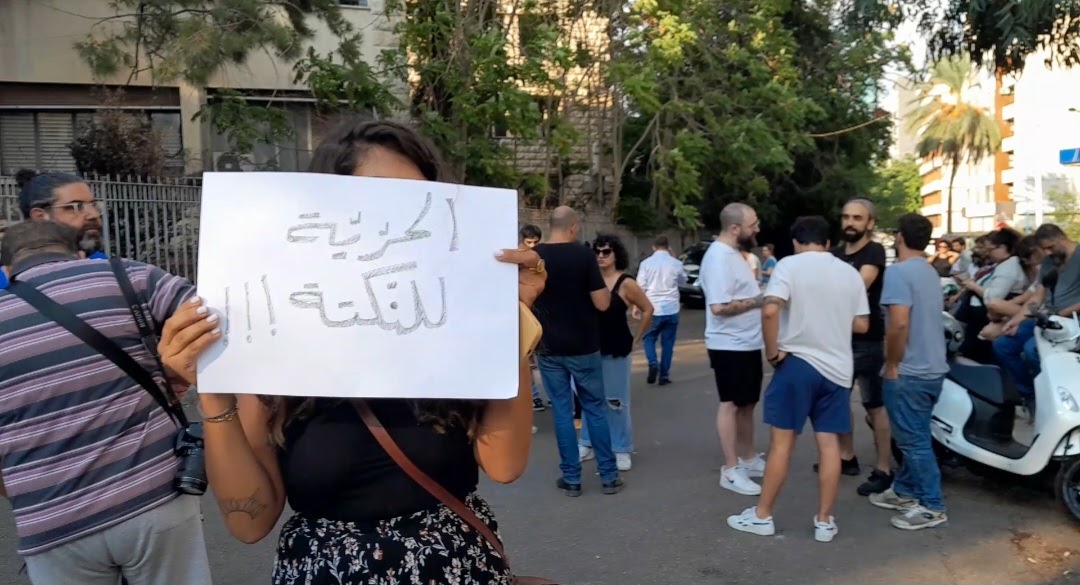Lebanon’s crackdown on freedom of opinion and expression shows no signs of abating. From journalists, activists, and even lawyers, the state has found a new target: comedian Nour Hajjar.
On Tuesday, Lebanon’s Public Prosecutor, Judge Ghassan Oueidat, decided to release Hajjar after seven hours of detention on the condition he keep the court informed of his whereabouts. However, it remains unclear whether Hajjar will still face prosecution and be summoned for further questioning or whether he was forced to apologize or remove the comedic content that led to his summoning.
Before this, Oueidat had requested a 48-hour preventive detention, which could be extended once, for a fragmented comedy clip from one of Nour Hajjar’s stand-up performances in 2018. In this clip, Nour jokes about an incident involving him and his mother at a funeral.
This marks Hajjar’s second summons in just a matter of days. On Friday, August 25, he was called in by the military police in Al-Rihaniye and was held there for over 11 hours. This detention was prompted by a joke from his recent show about army members now working as delivery drivers to survive in Lebanon. Hajjar’s statement critiques how the government can barely pay its military, forcing them to work multiple jobs to make ends meet.
On Tuesday, August 29, when Hajjar arrived at the Military Police headquarters to sign the bail bond, he was unexpectedly transferred to the Criminal Investigation Department. Judge Ghassan Oueidat had decided on his transfer without notifying Hajjar’s legal representative.
The second arrest was based on two reports filed by Muslim sheikhs from Dar Al-Fatwa. They accused comedian Hajjar of “committing crimes against the Islamic religion, inciting religious and sectarian discord, ridiculing the Qur’an, and undermining national unity.”
In response to Hajjar’s detention, civil society, journalists, human rights advocates, and Hajjar’s fellow comedians gathered outside the Palace of Justice on Tuesday, demanding his release.
Humor is Not a Crime
In Nour Hajjar’s case, no formal complaint was filed. Instead, two pieces of information were provided by a sheikh from the Sharia court and the secretary of Dar al-Fatwa, according to Hajjar’s lawyer, Diala Chehade, in her interview with SMEX.
“The video clip involving Hajjar dates back to five years ago, which should exempt him from legal prosecution involving public rights.” She also urges the Lebanese judiciary not to be swayed by religious sentiments fostered by social and societal “trends.” Instead, she emphasizes the importance of the judiciary understanding the context of Hajjar’s and other artists’ work.
Sarcasm and humor shouldn’t necessitate legal action, and, as Chehade explained, there’s no crime inherently linked to jokes. She also points out that an act would be considered a crime only if it harms religious rituals. The latter case should be approached with caution, however, particularly if the context is fragmented and unclear.
SMEX attempted to contact Hajjar to clarify the decision to release him, but unfortunately, no response was received. It appears that comedians have chosen to remain silent for the time being, possibly opting to release a collective statement in response.
The Crime of the Joke vs. the Crime of the Century
Nour Hajjar’s case has sparked confusion and controversy within the Lebanese public, leading to divided opinions among supporters and opponents. However, there has been significant disapproval of the incitement that escalated to calls for extreme actions, even going as far as advocating for violence.
The Coalition for Freedom of Opinion and Expression in Lebanon, a group comprising various Lebanese and regional human rights organizations and institutions, released a statement today condemning the Public Prosecutor’s biased decision. The coalition has further appealed to judicial authorities to provide robust legal protection for comedic works, especially considering the current tense circumstances.
Notably, the demonstration outside the Palace of Justice occurred on the same day that the former Governor of the Banque du Liban, Riad Salameh, was expected to give his testimony in person.
However, Salameh did not show up, and his lawyer said they could not contact him and didn’t know his current residence. This angered protesters, as Lebanese authorities appear to let corruption suspects evade jail and investigation while arresting artists and activists.
Comedy in Lebanon is in Danger
Although comedy can sometimes generate controversy, its influence on people can be substantial.
Comedian Mohamed Baalbaki, who joined in solidarity with Hajjar, highlights to SMEX that watching and sharing comedy has become significantly more widespread in the digital era. Access to the internet has opened doors for a broader audience, potentially creating wider awareness among different groups of people.
Comedy in Lebanon has always served as a means to find humor amidst the country’s challenging circumstances. Unfortunately, creative freedom and satirical critique have now encountered “the scissors of censorship.” It is concerning that comedians are now subject to prosecution and arrest, warned Baalbaki.
Baalbaki asserts that comedy’s role is expanding, particularly due to its proliferation on digital platforms. Paradoxically, security services seem focused on pursuing influential artists while paying no heed to more dangerous offenders.
Does this mark another instance of the judiciary’s bid to impose self-censorship on Lebanon’s comedians and cultural voices?



